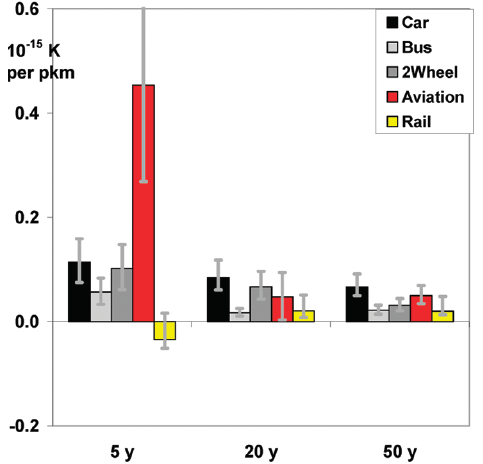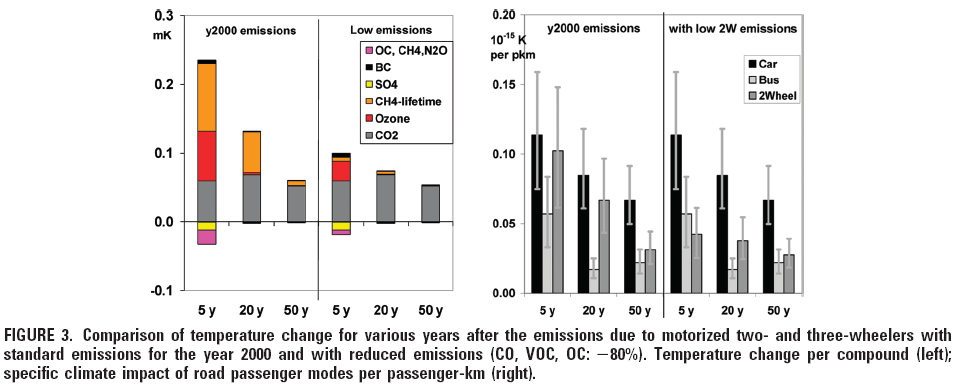Toshi
10 kW
The ACS journal Environmental Science & Technology just published a paper that's very relevant to my interests.
Borken-Kleefeld J, Berntsen T, Fuglestvedt J. Specific Climate Impact of Passenger and Freight Transport. Environ. Sci. Technol. 2010;44:5700. DOI: 10.1021/es9039693, or direct PDF link here.
This paper is interesting for a few reasons. First is that it doesn't limit its analysis to a simple counting of tons of CO2 per unit travel, as do many simplistic USA Today-article-style fluff pieces: instead it looks at CO2, sulfate aerosols, NOx effects including methane destruction, including the interaction of these elements with cloud formation. It sums up all of these effects in terms of net average global surface temperature change. Furthermore, it extends its analysis beyond the short term, looking at 5, 20, and 50 year time horizons. Due to its unique analysis it comes up with some results that I most definitely did not expect!
Although they graph out all manner of permutations of different possible emissions regulations on ships, planes, motorcycles, etc., most of that is boring even to transportation-and-climate-obsessed me. Instead I think the most pertinent figure is the passenger travel part of Figure 1: "Temperature change per transport work by mode for various years after the emissions". The units are in micro-Kelvin per passenger-kilometer, where passenger-kilometer is the product of number of passengers transported by the distance traveled. Error bars represent +/- 1 std. dev. The figure:

In the short term (5 year time horizon) these results line up with my preconceived notions: airline travel is far, far "dirtier" than driving a car, which is a bit dirtier than driving a motorcycle, which in turn has a greater environmental impact than riding the bus. What's this about riding the train actually leading to net global surface temperature cooling, though? It turns out the sulfur spewed out by all those coal-fired electrical generation plants driving electric trains and diesel generators onboard diesel-electrics leads to cooling through the secondary effect of methane destruction.
The results really get interesting at the 20-year and 50-year time horizons. Note that airline travel at these time horizons has less of an impact on temperatures than driving a car! I would not have anticipated this result at all.
In the authors' words:
Also of note for the motorcycle and scooter apologists out there is that adopting stricter emissions controls (ie Euro 3) leads to near-parity of the effect of bus and powered-two-wheelers, whereas with year 2000 emissions the bus comes out strongly in the lead. The moral of this little sub-story: if you're running your motorcycle catless or if it's pre-Euro 3 emissions you're not doing the environment any favors, so go ahead and wipe that smug smile off your face and take off that "one less car" sticker.

Borken-Kleefeld J, Berntsen T, Fuglestvedt J. Specific Climate Impact of Passenger and Freight Transport. Environ. Sci. Technol. 2010;44:5700. DOI: 10.1021/es9039693, or direct PDF link here.
This paper is interesting for a few reasons. First is that it doesn't limit its analysis to a simple counting of tons of CO2 per unit travel, as do many simplistic USA Today-article-style fluff pieces: instead it looks at CO2, sulfate aerosols, NOx effects including methane destruction, including the interaction of these elements with cloud formation. It sums up all of these effects in terms of net average global surface temperature change. Furthermore, it extends its analysis beyond the short term, looking at 5, 20, and 50 year time horizons. Due to its unique analysis it comes up with some results that I most definitely did not expect!
Although they graph out all manner of permutations of different possible emissions regulations on ships, planes, motorcycles, etc., most of that is boring even to transportation-and-climate-obsessed me. Instead I think the most pertinent figure is the passenger travel part of Figure 1: "Temperature change per transport work by mode for various years after the emissions". The units are in micro-Kelvin per passenger-kilometer, where passenger-kilometer is the product of number of passengers transported by the distance traveled. Error bars represent +/- 1 std. dev. The figure:

In the short term (5 year time horizon) these results line up with my preconceived notions: airline travel is far, far "dirtier" than driving a car, which is a bit dirtier than driving a motorcycle, which in turn has a greater environmental impact than riding the bus. What's this about riding the train actually leading to net global surface temperature cooling, though? It turns out the sulfur spewed out by all those coal-fired electrical generation plants driving electric trains and diesel generators onboard diesel-electrics leads to cooling through the secondary effect of methane destruction.
The results really get interesting at the 20-year and 50-year time horizons. Note that airline travel at these time horizons has less of an impact on temperatures than driving a car! I would not have anticipated this result at all.
In the authors' words:
Borken-Kleefeld et al. said:For the passenger travel of the year 2000 [ed: odd grammar theirs, allowing for non-native English writers] the modes with clearly lower specific climate impact than car travel can be readily identified: Rail travel has at least a factor 4 lower specific impact and is cooling on shorter times, bus and coach travel has 2 to 5 times lower specific impact, while travel with two- or three-wheelers has up to a factor 2 lower specific climate impact than car travel. Air travel results in a lower temperature change per passenger-kilometer than car travel on the long run; the integrated radiative forcing of air travel is on short- to medium time horizons much higher than for car travel.
Also of note for the motorcycle and scooter apologists out there is that adopting stricter emissions controls (ie Euro 3) leads to near-parity of the effect of bus and powered-two-wheelers, whereas with year 2000 emissions the bus comes out strongly in the lead. The moral of this little sub-story: if you're running your motorcycle catless or if it's pre-Euro 3 emissions you're not doing the environment any favors, so go ahead and wipe that smug smile off your face and take off that "one less car" sticker.


